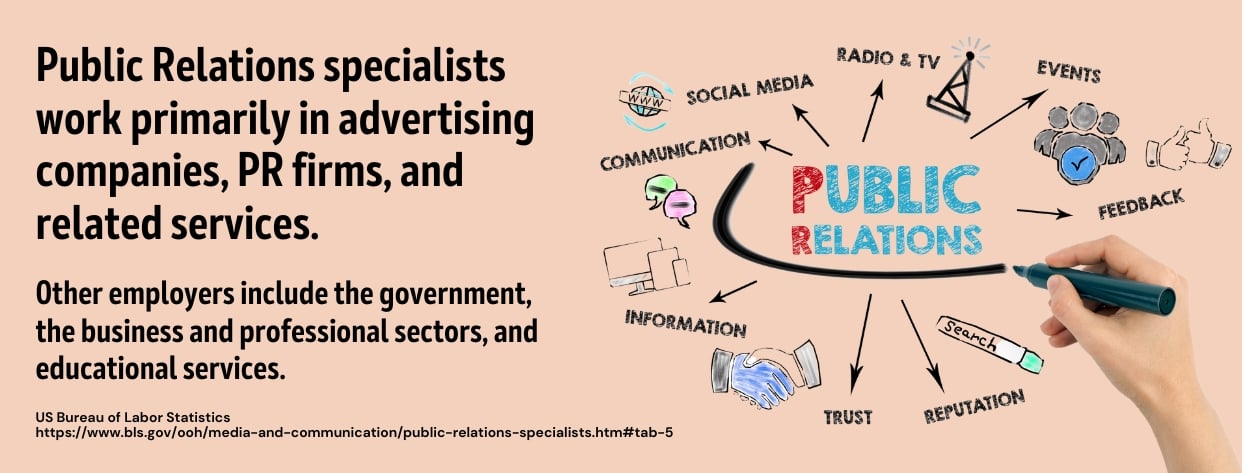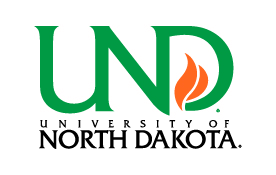5 Best Online Doctorate in Public Relations

Find your perfect college degree
In this article, we will be covering...
People who are passionate about public speaking and engaging with practical strategies to manage the public image of individuals, companies, and organizations will find pursuing a public relations major ideal for their career goals. This kind of profession creates an exciting life that is most suitable for those who prefer variety in their everyday duties.

Working professionals who wish to enhance their credentials and boost their career growth opportunities in the field may want to consider earning a doctorate in public relations. This terminal degree opens up better chances at promotions and higher compensation. With a Ph.D. program in public relations, they will be able to gain advanced knowledge and competitive skills that will help them keep pace with the ever-evolving field.
Currently, public relations and fundraising managers have a median pay of $125,620 per year, according to the Bureau of Labor Statistics. This is higher than the median pay of public relations specialists, which is $67,440 annually.
Additional Resources:
- The Best Online Doctor of Public Policy/Administration Degrees
- The Best Online Doctor of Criminal Justice Degrees
- Best Online DBA Degrees with No Dissertation Programs
Quick audio summary:
Overview
Many colleges and universities offer online Ph.D. degrees in public relations. Some of these are available online. Earning an online Ph.D. in public relations or communications programs means that working professionals will be able to pursue further education without compromising their budding careers. Online degree programs often offer more flexibility and convenience, with self-paced learning and an option to complete their coursework anytime and anywhere.
Note, however, that most of the degrees in public relations are interlinked with communications programs, such as strategic communication. Marketing programs also extend to public relations concentrations.
Methodology
While most public relations undergraduates become public relations specialists, an advanced doctoral program will give them an edge when it comes to higher positions! Our list of the top online Doctorate in Public Relations consists of graduate programs and schools that are best known for these academic features:
- Features online or hybrid Public Relations coursework with concentrations that lead to the most lucrative careers,
- Delivered via a robust Learning Management System so that adult learners can conveniently and easily access their doctoral coursework,
- Taught by expert PR professionals who are doctorate degree holders, working to discover industry trends and address issues surrounding the profession,
- Duly recognized by accrediting agencies that establish the academic standards in Public Relations instruction at the doctorate level,
- Provide financial aid options for qualified doctorate students and candidates,
- Highly esteemed among Public Relations organizations that are committed to the advancement of the workforce and the PR industry.
Discover how we rank the best Doctorate in Public Relations programs. Explore our Methodology.
Best Online Doctoral Programs in Public Relations
Indiana University of Pennsylvania

Ph.D. in Media and Communication Studies
The Indiana University of Pennsylvania offers a Media and Communication Studies Ph.D. program, which prepares students for a variety of careers, such as university-level educator roles, in corporate communications, and media production and management.
The program is designed for both full- and part-time students and follows a cohort model with a weekend-based scheduling format. The Ph.D. in Media and Communication Studies degree program has a total of 90 credit hours required for graduation.
Starting in 2023, Indiana University of Pennsylvania will start to offer this degree in a hybrid format, which will combine face-to-face classes with online coursework. A unique point of the program is its special emphasis on practical, hands-on experience. Students progress through a curriculum that is grouped into the major thematic areas of Media Research and Teaching, Media Processes and Production, and Media Issues and Effects.
The curriculum includes courses dedicated to academic and applied research, but also to technology-centered media production courses, and courses related to media planning and implementation, which include the following:
- Media Ethics
- Documentary Production
- Multiplatform Media Production
- Crisis Communication
- Children and Media
- Culture of Cyberspace
- Media Criticism
As part of the program’s final requirements, students are required to complete a dissertation on top of passing a comprehensive examination. Students also have to maintain an overall GPA of 3.0 or higher.
University of North Dakota

The University of North Dakota offers an online Ph.D. in Communication. Courses can be completed 100% online with no on-campus requirements. This online doctorate program is designed to help prospective students study the different ways of communicating, preparing them for leadership roles locally and globally. They will gain knowledge and skills that will set them apart from competitors, giving them an edge as a leader in international and intercultural communication.
To earn the program, doctoral students are required to complete a total of 90 credit hours of coursework. The courses within the program provide in-depth knowledge of areas that are relevant to the field of public relations. This includes subject areas such as Qualitative Research Methods, Interpersonal Relations and Communication, Social Network Analysis & Visualization, Information Communication Technologies, and Theoretical Perspectives in Communication. This program can typically be completed within 3 to 5 years.
Regent University

For public relations professionals who wish to strengthen their knowledge and skills and enhance their credentials in the field, a Ph.D. in Communication offered by Regent University is an ideal choice. This online doctorate program provides communications professionals with broad interdisciplinary training in their teachings, scholarly writing, and research as they explore the field of communication and public relations.
With a total of 64 credit hours, the courses covered in this communications program include Advanced Communication Theory, Academic Writing for Publication, Communication Research, and more. This degree can lead to fulfilling careers in media and public relations, professorship, research, executive leadership, and writing, among others.
Some of the requirements to get admitted into this communications degree program include a master’s degree, an unofficial college transcript, and an online application.
Liberty University

Liberty University offers a Ph.D. in Communication degree program, which helps students deepen and enrich their understanding of human interaction and mass communication. The program is offered in an online format.
The program contains 60 credit hours and has a primary focus on research and theory, and features course content that fits the diverse and in-depth range of topics that is typical of communications degrees, and includes the following:
- Social, Mobile, and Online Media Analytics
- Mixed Methods Research
- Event Planning & Donor Relations
- Strategic Communications Campaigns for the Digital Age
- Advanced Communication Theory
The program equips online students with the skillsets crucial for moving into roles in the advertising and public relations professions, but also in other related careers such as customer experience, online sales and services, research, and teaching roles in higher education.
Most importantly, Liberty University emphasizes professional practice that is grounded on ethics and spirituality in the Christian tradition and thus integrates Biblical principles into its curriculum, preparing students to not only be competent experts and professionals but also, in their words, Champions for Christ.
As part of its final requirements, this online degree program concludes with the completion of a dissertation, which is worth 15 credit hours. The Liberty University Communication Ph.D. program also requires students to maintain a GPA of 3.0 to graduate.
Robert Morris University

Ph.D. in Information Systems and Communications
Robert Morris University offers a Ph.D. in Information Systems and Communications program. It contains a total of 60 credit hours and is offered as an executive-style, 3-year Ph.D. Program. Delivery is in a blended learning format, which blends online coursework with a number of multi-day face-to-face residencies. The program also follows a cohort model, letting students progress together and minimizing the isolation of graduate coursework.
Being an executive-style Ph.D. program, it is designed to prepare working professionals and executives for excelling in a variety of leadership roles in the industry and to prepare educators and researchers for roles within the fields of information systems, technology, or communications.
The program curriculum is designed as an interdisciplinary program and is aimed to deepen students’ understanding of the connections between information technology and human communication. Being a research-oriented Ph.D. degree, the program lets students explore a broad range of problems and topics in several key research areas that include the following:
- Cultural and Social Impacts of Communication & Technology
- Knowledge Management
- Online Communities and Social Media
- Human Communication & Technology
- Adoption & Utilization of Emerging Technologies
The degree program concludes with the successful completion of a dissertation, whose preparation spans the entire length of the program. A major milestone for the program is the qualifying examination at the end of the first year, which determines a doctoral student getting admission into doctoral candidacy.
Common Courses in Doctoral Programs in Communication
The nature of the work involved in Public Relations professions is largely centered on communication and involves related skill sets.
While universities largely create their own unique curriculum designs and offer courses according to their stated learning objectives for their degrees (sometimes combining or subdividing course content into different courses), their degrees largely have similarities in terms of the courses they offer. While their courses might differ by name, they can still tend to follow the same overall theme.
Here are some of these courses:
Theories of Communication, Knowledge, and/or Information
These three form part of the set of core courses in typical Communication Ph.D. programs and set out to provide grounding on the various theoretical bases and principles that underpin communication. Depending on curriculum design, universities can split these key content areas into different courses.
Content-specific communications
Communicating different content types to different audiences is often governed by their own set of rules, dynamics, and needs. Some universities have curriculum designs that offer content-specific communication courses, such as political communication, crisis communication, health communication, organizational communication, or communication strategies best suited for educational content, which is ideal for the work involved in public relations.
Media Ethics
As with any profession and discipline, Communication is governed by ethics, given its prominence in society and the crucial nature of the role it plays. Universities often invariably have a specific course dedicated to media ethics.
Audio Production
Audio production is itself an art form, and some forms of broadcast media are centered solely on audio, such as radio. There are also a variety of professional tools, platforms, and workflows currently available for audio production, and many degree programs have a separate course dedicated entirely to this skill set.
Video Production
Similar to audio production, video production is its own discipline and involves a larger array of sub-disciplines and skill sets that come together in the video production workflow (including an overlap with professional audio, incidentally). Hence, many degree programs dedicate a course solely to video production.
Online Media/Communication in the online space
Perhaps one of the timeliest and most crucial key content areas deals with communication in the online space, a fast-paced and oversaturated environment where the most well-crafted communications strategies compete for attention with spontaneous viral memes.
One of the biggest challenges for public relations managers comes with contending with communications challenges in this space, and traditional media and communications have also extended into the online space. This key content area is often treated as a separate course.
Global Communication
It’s one thing to communicate to a local audience; communicating to a global audience comes with its own set of nuances and challenges that have to be contended with, and in the global communications space, one’s message has to contend with multiple sets of cultural realities. As a result, this is often deservedly treated as a course unto itself.
Qualitative and Quantitative Research Methods
Communications involve research skills, and communications professionals are expected to have competitive research skills and be proficient in various methods for qualitative and quantitative research methods. Communications degree programs often treat these widely different research methods as separate courses, and they may also have further courses dedicated to research design, as well as courses that are aimed at preparing students’ final dissertations.
Common Career Paths for Doctorate in Public Relations Graduates
A career in public relations is often perceived to be limited. However, this field can be vast, with a wealth of opportunities for career growth. A terminal degree in public relations can prepare doctoral students for the highest positions in the field. This includes pursuing an academic career and media and communication occupations.
The additional training provided by a doctoral program in public relations can help one develop their career and thrive in a competitive and exciting field. Here are some of the possible career paths that they can choose from.
Nonprofit Executive Director
Nonprofit organizations often have chief executive officers who oversee the day-to-day operations. They work with the board of directors to achieve the organization’s goals and objectives.
For nonprofit executive directors, the responsibilities encompass supervising the development and management of the organization. They might need to take care of direct community outreach programs and make sure they are properly implemented and provide financial oversight for overall operations.
Nonprofit executive directors must be excellent communicators as their job usually entails promoting the organization at events and serving as the face of the organization. They must also be knowledgeable about fundraising, which means they must possess curiosity, relationship-building, and storytelling skills.
Public Relations Director
Much of the tasks of public relations directors is to maintain and protect the reputation of their clients. This can be done by preparing effective news releases and media kits along with PR strategies.
PR directors can be found in a variety of settings, including business, healthcare, and education. Health communication is particularly important in the healthcare industry, so public relations is a handy degree for those who take on leadership roles. As public relations director, one is expected to evaluate and authorize all forms of communication that have to do with communications being released to the public.
Public relations directors must have leadership skills and a thorough understanding of the latest marketing trends. They also need to be excellent communicators.
Professor
A career in the academe can be a rewarding and lucrative choice for those whose academic interests lie in teaching. Professors can work in a variety of higher learning institutions, including community colleges, four-year colleges, and universities.
Their tasks often involve designing syllabi to meet the department’s educational goals and teaching courses. It is also part of their job to assess students’ progress, mentor undergraduates and graduates, and oversee various projects. Professors are expected to conduct and publish original research to further scholarly learning.
Some of the skills needed by professors to thrive in their careers include good communication, reasoning, problem-solving, time management, and interpersonal communication skills.
Marketing Director
Responsible for overseeing the successful execution of marketing tasks within the organization, marketing directors, along with marketing managers, are good at creating projects that meet the needs of the organization they serve. They often communicate with the clients to find out what they need and manage the marketing staff who will be implementing the strategies formulated. They also monitor the progress of the marketing campaigns and submit performance reports.
To succeed in this career, excellent leadership and organizing skills are a must. They must also employ their analytical and creative thinking proficiencies.
Skills Needed to Excel in an Online Ph.D. in Public Relations
Public relations is a dynamic field that requires competent professionals who are always on the go and up for the challenge. It is not easy to survive in the field. To be successful at what they do, public relations professionals must possess key skills that can help them grow and thrive in their roles. Here are some of them.
Interpersonal Skills
Much of the public relations job description requires a hefty dose of interpersonal skills. Their work often involves closely working with different types of people and organizations, which means they must know how to conduct themselves in different social settings and deal with a variety of personalities. They must be able to communicate and interact with the media to push out their messages and get their points across.
Organizational Skills
The demanding job of public relations professionals requires them to employ organizational skills. This will enable them to manage various tasks at once, oversee projects and campaigns, and manage expectations. They will be able to meet deadlines and achieve their goals with this essential and handy skill.
Public Speaking
Public relations professionals need good public speaking skills as they are expected to serve as the face of their clients and speak during press conferences, give interviews, and present in a room full of people. They have to be confident when giving out speeches. It is important for them to deliver the message they want to push out clearly and make sure they are representing their clients well.
Writing
Writing captivating and persuasive content is needed by every competent public relations professional. This skill can aid them in presenting sample articles, press releases, and copy to the media. They must be able to understand their audience and choose words that can clearly get their messages across. To be better at writing, they must make sure to keep their sentences short and use easy-to-understand language.
Communication
Good communication skills are key to successful public relations careers, including those in government agencies and public administration. This skill also comes in many forms. There are mass communication, political communication, strategic communication, organizational communication, and technical communication.
To communicate effectively, one must have a clear intent. They must be able to express themselves in a variety of situations, whether in delivering a critique or circumventing a negative press. Most communication studies programs go in-depth in providing knowledge and skills for this particular ability.
Media Literacy
Knowing the different media at their disposal can help public relations professionals ace their jobs. This knowledge can be instrumental in formulating an effective strategy for their clients and taking advantage of the platform to communicate with the public. In the age of social media, it is important to know which platforms are the most effective by getting to know the audience of each and knowing which types of messages work best.
Critical Thinking
Critical thinking is the ability to form thoughts in an organized and rational approach to understand the connections between ideas and other concepts. Good critical thinking skills are needed by PR professionals to identify the problem and analyze the data. This can help them make informed decisions for better outcomes.

Frequently Asked Questions
Is it worth earning an online Ph.D. in Public Relations?
An ideal choice for those with a passion for communication and marketing, a Ph.D. in Public Relations is surely worth it. This doctoral degree program provides doctoral students with an opportunity to conduct research and strengthen their knowledge and understanding of social media strategy.
They are integral to the success of many organizations by helping the latter build a difference in their relationship with the public. Ultimately, through effective communication, public relations professionals get to build a strong following for the organization and establish brand loyalty and trust.
What’s the timeline for completing an online Doctoral degree in Public Relations?
Most online doctoral programs in public relations can typically be completed in 3 to 5 years. This largely depends on their capacity as doctoral students. Those enrolled full-time will understandably earn the degree quicker than those enrolled part-time.
Some doctoral programs are offered in asynchronous formats, which means doctoral students will be able to go through the coursework at their own pace. This can contribute to the length it takes for them to complete the program.
What are the general admission requirements to enroll in online Doctoral degree programs in Public Relations?
General admission requirements to Ph.D. programs in public relations and communication often include lodging an online application, submitting academic transcripts and resume, demonstrating experience in public relations or related fields, and showing proof of having earned a master’s degree from a college or university that is accredited by a colleges and schools commission or agency.
It is important to note, however, that requirements may vary from university to university, so students should check the specific requirements of the school of their choice.
What are the benefits of taking on a Doctorate in Public Relations that is offered online?
Before anything else, the current set of technologies used in online classes still has the disadvantage of not being able to fully replicate the much-loved and time-tested learning environment that comes from face-to-face interactions in traditional on-campus classes. Taking on the asynchronous coursework of online degrees, while largely alone, can also lead to a feeling of isolation for some.
While this remains a primary disadvantage with online degrees, this isn’t as severe when one looks at the advantages. Online degrees, particularly online doctorate degrees, are designed primarily for the busy schedules of working professionals in mind. The type of coursework and schedules in online degrees give students a greater chance to balance schooling with their prior professional and personal commitments.
There may be little or no face-to-face interaction in various online programs. However, these still bring a range of opportunities for students to interact not only with their faculty but also with their peers, especially with online degree programs that still follow a cohort model.
Online programs also mean real-world savings for students. On top of federal financial aid opportunities and possible scholarships and grants, students largely do away with the costs to travel to campus for classes (especially for students far from campus), or in the case of degrees offered in a few universities, having to move to a new city entirely.
How much do online Ph.D. programs in Public Relations and Communications cost?
In terms of overall cost, universities’ rates can vary widely, as they tend to have different sets of costs that they include in a degree program, such as fees that go into the upkeep of hardware, in the case of universities that offer online degrees.
Some states and cities can also have a higher overall cost of living, and this may also reflect in a university’s overall cost if it is based in such areas. Some universities also have two-tiered tuition rates, where they have slightly lower tuition rates for out-of-state students.
A good starting point for getting a cost estimate, however, is to go by the per-credit-hour cost multiplied by the number of credit hours for a degree. Doctoral programs in Communication cost around $1000 per credit hour, as is typical of many terminal degree programs; however, some universities offer much lower rates, closer to around $500 per credit hour. Communication Ph.D. programs, meanwhile, have around a total of 60 credit hours.
Universities will tend to offer their own set of scholarships and grants that students can access on top of federal financial aid, and some may also facilitate customized payment plans and offer discounts for certain sectors, such as members of the armed forces, so it is best to communicate directly with particular universities.
Key Takeaways
Doctoral degree programs in Public Relations, much less online ones, are fewer in number than other disciplines. However, there are a number of Ph.D. programs in Communication that fulfill the need just the same, with communication at the heart of this profession.
Communications doctoral programs teach students skill sets in producing content for various media, such as audio and video, along with communications theory and strategy. With the majority of programs in this list being Ph.D. programs, students are expected to conduct original research as a final part of their degree in the form of dissertations.
Since Ph.D. programs are primarily aimed at working professionals, enrolling in online or hybrid programs brings its own set of benefits, particularly the added flexibility to balance coursework and professional commitments.




